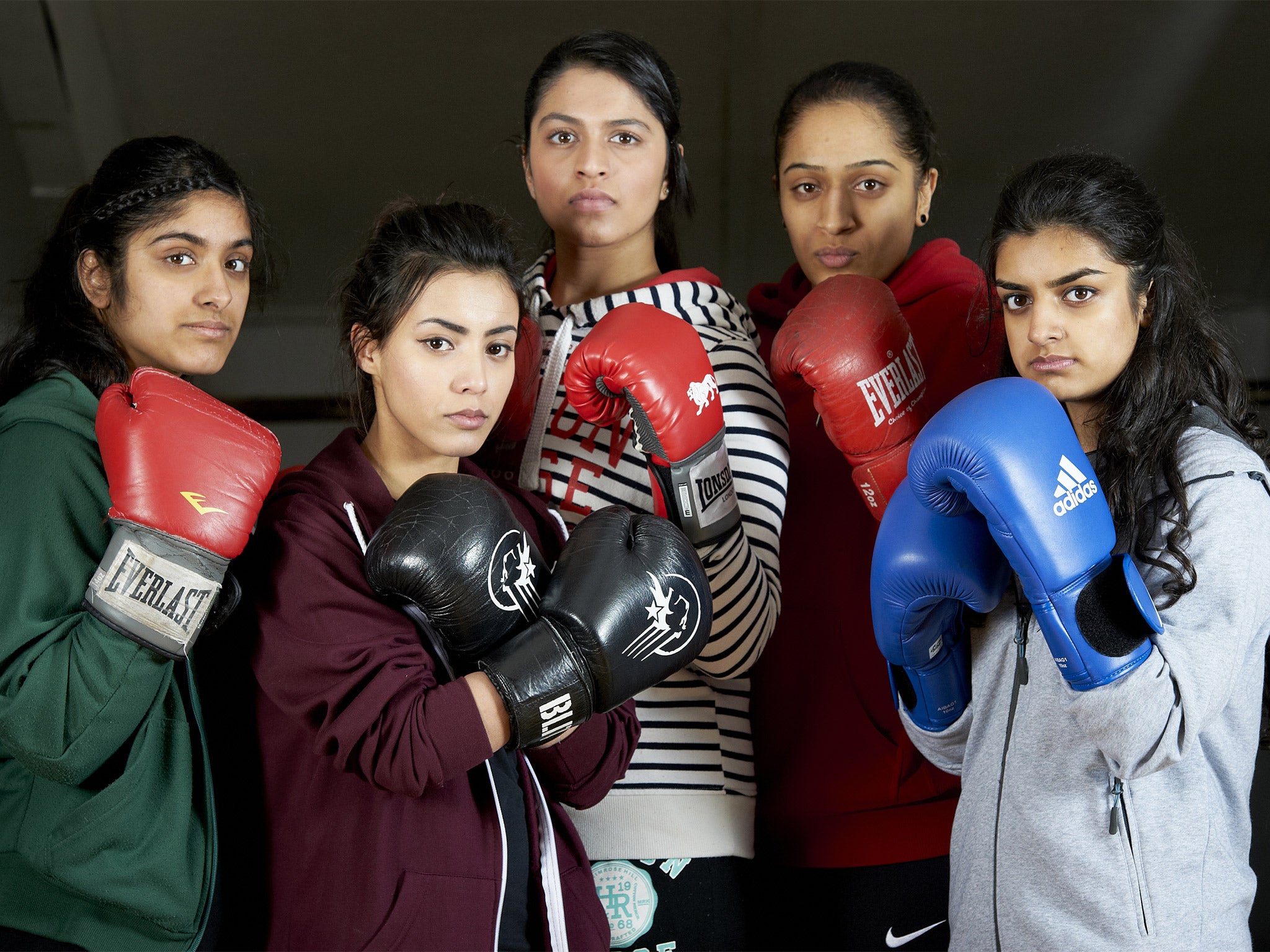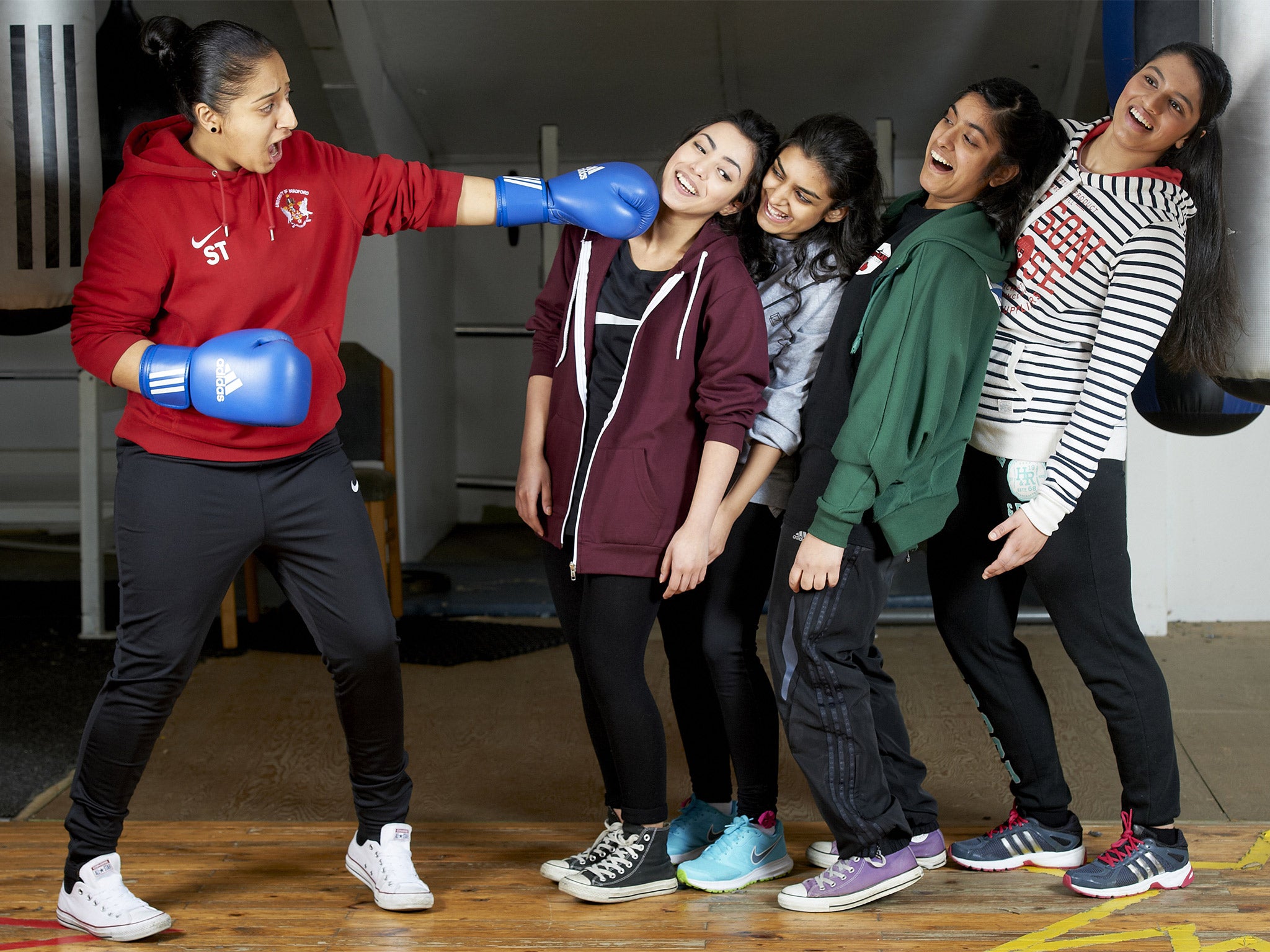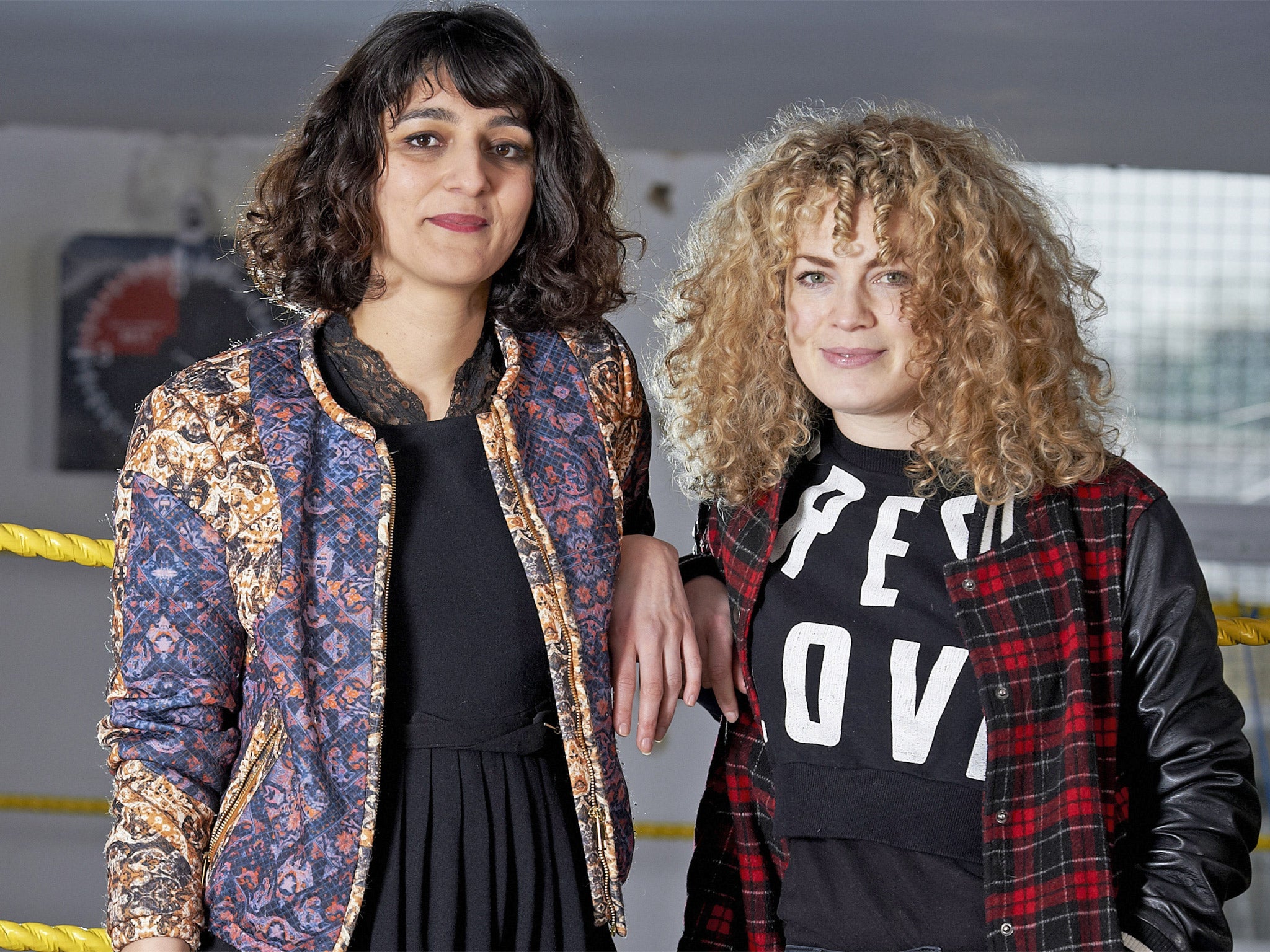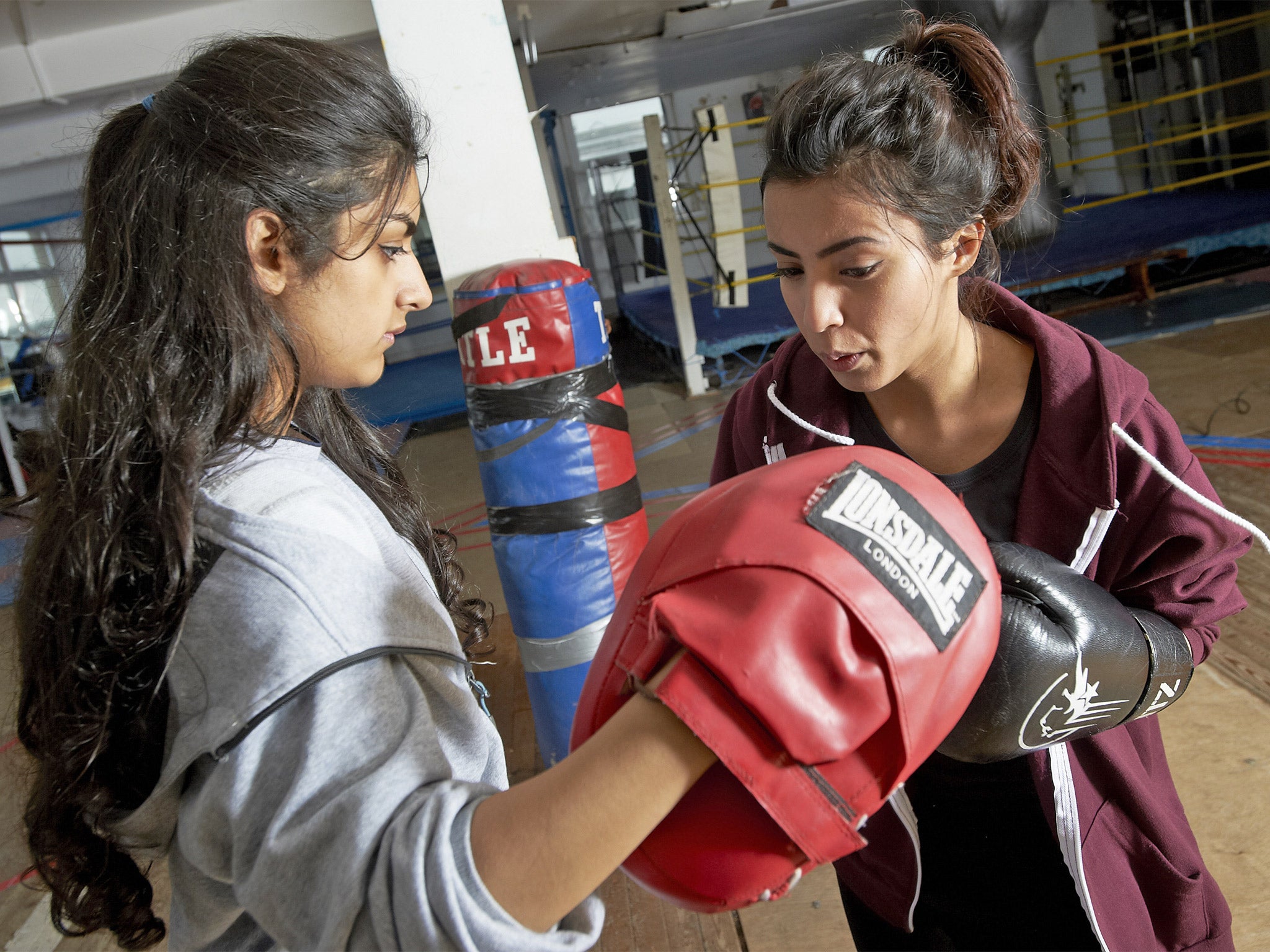Pakistani women come out fighting: A hard-hitting play focuses on female Muslim boxers
Too often, young Muslim women are depicted as oppressed and subservient, the victims of forced marriage, or aspiring jihadi brides. 'No Guts, No Heart, No Glory' is trying to change that, with the bravery of its script – as well as its cast

It is a rainy Sunday afternoon in Bradford and three teenage girls are pummelling heavy punchbags that hang from the ceiling of Huggy's Boxing Gym. "Your punches are fine but I want to see a bit of aggression," says their coach. "Don't be afraid to grunt." The girls continue to land uppercuts and right hooks. While there's nothing incongruous about the gender of the boxers in these days of Olympic medal-winning female fighters, these young women are also British Pakistani Muslims. The girls in the gym are preparing for their roles in No Guts, No Heart, No Glory, a play about the lives of young, female Muslim boxers which premiered at the Edinburgh Festival last year and arrives in London tomorrow. Most of the girls are not professional boxers and none are professional actors – they are college and university students whose real-life stories and experiences are incorporated into the play.
"The portrayal of Muslims in places like Bradford is that everyone is really extremist and people don't let their girls do anything," says Evie Manning, director of the play and co-founder of the theatre company Common Wealth. "But there are liberal Muslim people in the community who don't get talked about."
Manning and Aisha Zia, who wrote the play, are also in the gym and are leaning against the ropes of the boxing ring as we talk. Manning is from Bradford and she admits that she had her own assumptions challenged when her mother's niqab-wearing Iraqi neighbour told her that she was a member of an all-women boxing club and invited them both to join. Having begun to question her previous thinking, Manning contacted Aisha Zia.
"I was interested in writing about Muslim women and empowerment," Zia tells me. "I wanted to challenge expectations and stereotypes." The moment that Manning and Zia realised they had a story to tell was while conducting research. They learnt about Ambreen Sadiq and Saira Tabasum, both female boxers, both British Pakistani Muslims and both living in Bradford. "We contacted them and their true stories became the starting point of the play," Zia says.
Ambreen Sadiq, 20, takes a break from coaching the girls to talk to me. She was 13 when she first put on a pair of boxing gloves. "My younger brother and dad took me and I just loved it – I knew it was for me," she recalls. She started training at the gym three times a week and her father bought her a punchbag at home. When her coach suggested that she consider boxing competitively, she was initially unsure.
"I didn't know if girls were allowed to box," she says. "I thought it was a boys' sport but my parents said I should go for it so I had my first competitive fight when I was 15. It was the biggest buzz I had ever had." Ambreen is mixed race – her father is Pakistani and her mother Portuguese. "I got bullied a lot growing up," she says. "I would get Paki this and Paki that and then Portuguese this and that – I had to fight a lot, both girls and boys. I would react and defend myself. Taking up boxing made me feel safe."

Although her parents were supportive, Ambreen faced some opposition from relatives. "My uncle came up to me after my first fight and said 'this was your first and last fight'. Meanwhile, other relatives were saying to my mum and dad 'why are you allowing your daughter to fight?'." Ambreen was so confused as to whether a Muslim was allowed to fight that she consulted an imam who told her that men and women were equal, and of course she was allowed to fight. She's now a former UK national champion and all the relatives who were hostile, cheer her on.
Once they had found Ambreen and Saira, Manning and Zia began to explore how to find other young women for the production. They were looking for girls who could learn how to act and box, so they contacted schools and colleges and held workshops and auditions. "We were looking for women who were confident about being themselves," explains Manning. "They would be playing the most unafraid, powerful version of the person they were." The girls that they finally selected have come from across Bradford and their parents are from different parts of Pakistan, some are working class and others middle class; speaking to them, what they all had in common was that they were all supremely confident and articulate. "People come to the play and expect to see oppressed girls but actually they are having fun, they are angry and aggressive and dancing," says Manning.
While Manning and Zia are keen to promote the positive messages in the play, it is hard to deny the real challenges faced by young Muslims in Bradford, from both inside and outside their community. "I have Muslim friends and neighbours who I feel totally integrated with, but on a structural level there is definite intentional segregation going on in Bradford – there are white kids on my street whose parents drive them to a different school," says Manning. Ambreen adds: "When my brother used to hang out with white people, the Asians would have a problem with it. He had to leave school because he got battered by the Asians for hanging out with white boys."

During her research, Zia asked the young women they'd recruited for their stories about bullying and being made to feel ashamed. Seherish Mahmood, who is 17, tells me about the impact shame can have on young lives. "At school we have a mixed friendship group [girls talking to boys] and I had a friend who was targeted by a cousin who saw that she was friends with boys. Someone sent a letter to her dad who was not happy and in the end my friend had to move to a different school."
The play does address some of these less palatable sides to the community. "We cast one girl and her parents were up for it," reveals Evie. "She came to one day of rehearsal and then she got pulled out because her uncles didn't like that there was dancing in the play." In the script one character asks: "How can we be truthful if we have to hide out of shame, feel humiliated for feeling, for saying, doing, thinking as we please?", while another describes fear as "getting in a car after a night out, watching your back because you think someone might be following you, someone might be trying to catch you out… so they can report back home."
The women that I talk to explain that their own situations are very different from these bleak tales. "My mum was supportive [about me boxing] but just wanted me to have a balance between study and sport," says Saira Tabasum, who became a British Universities champion a year after taking up boxing. "I am comfortable knowing I can do what I want so long as my family knows," says 18-year-old Nayaab Din. "My parents are really supportive about what I want to do," adds Freyaa Ali, who is also 18. "It's a stereotype that people are conservative. I think the community has evolved." When I ask Freyaa if there is are any differences between what she and her non-Muslim friends are allowed to do, she says: "I think it's the same, it's definitely the same." Really? She pauses. "Obviously there are more restrictions: they can go out and they have boyfriends and stuff but we can't – and obviously we can't drink alcohol."
After the training session, cast member Mariam Rashid, who is studying physics at Durham University, invites me to meet her parents at their home in Bradford. When she told her parents that she was interested in boxing they were surprised, but only because she seemed so inactive at home. "Things have changed and moved on a lot," her mother Shaheen tells me, while her father Abdul adds that "when people came here they were 100 per cent brought up in that culture but now its second and third generation so people are growing up with different cultures".

Would they like their daughter to marry a Muslim? "Yes, that is our preference," he says. "That hasn't changed," adds Shaheen. "You have to have something in common, the more you have in common the more chance that you will get along." When I ask whether there is anything that Mariam could do that would disappoint him, Abdul says the only thing that would sadden him would be if she didn't fulfil her potential. He tells me that he wept with pride when he saw his daughter on stage in the play.
The young women who feature in the play enjoy far greater freedoms and have more supportive parents than the women I knew when I was growing up in my teens and early twenties in a largely Muslim community in Luton. I knew young women whose parents hadn't allowed them to go university simply because of their gender and others were hastily married off after they had finished college. They too might have loved to have acted and boxed but would never have imagined having the opportunity. Things have, then, changed somewhat for the better and this is a story that is rarely reported. Manning and Zia's play is important and a desperately needed corrective to the usual media narrative around young Muslim women which depicts them as oppressed and subservient, the victims of forced marriage or as aspiring jihadi brides.
And yet while talking to the young boxers, my thoughts keep returning to those not in the gym. The girl whose uncle prevented her from appearing in the play. The girl who was pulled from school for being seen talking to boys. Are the young women I've met representative of widespread progress or are they exceptions? Manning and Zia say that their play is a celebration of female empowerment but it is arguably less a depiction of life as it is largely lived and more an exercise in liberal wish-fulfilment.
When I put this to Zia she doesn't disagree. "What is wrong with projecting a positive portrayal of how we would like society to be?" she says. The women in the boxing gym are, I suspect, among the lucky ones – and even they face restrictions in their social and private lives that remind me of my teenage years. For those not blessed with strong wills and supportive parents, who are battling the intolerant religious and culturally conservative forces in their families and communities, the fight goes on.
Common Wealth Theatre's 'No Guts, No Heart, No Glory' is at Southbank Centre's WOW: Women of the World Festival, 5-8 March, southbankcentre.co.uk/wow
Join our commenting forum
Join thought-provoking conversations, follow other Independent readers and see their replies
Comments